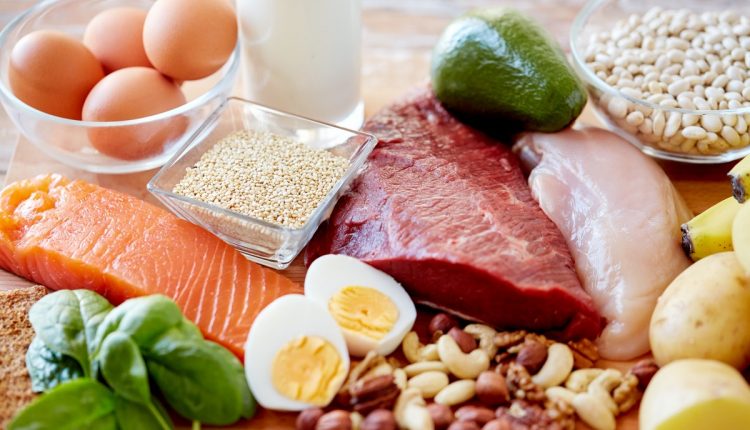
Essential Body Macronutrient: Protein
Protein is vital to your health and is needed for your body to survive, and replenish and restore muscle. It is the fuel you need to keep all your parts running optimally and on time. A sufficient protein intake in the diet is important throughout your life, especially as we get older. Protein can be found in different food sources. If you want to know more about protein, keep reading!
What is Protein?
Protein is found in your skin, bones, muscles and all your organ tissue. It is also found in the hemoglobin that carries the oxygen in your blood, hormones and the enzymes that play a part in the body’s crucial chemical reactions. It is an important body macronutrient that is used by the body for building, repairing and maintaining tissues.
Amino acids are the building blocks of protein. There are 20 different amino acids needed for the body to build protein, of which 12 are produced by the body and 8 are essentially needed through nutrition.
Types of Protein
There are different types of protein, some are “complete” and some are “incomplete.” Nutrition that contains complete protein is one that provides all of the 8 essential amino acids to build new proteins. Essential amino acids are the ones that the body can’t produce on its own. Animal sources (eggs, milk, meat, poultry and fish) of protein tend to be complete, providing the essential amino acids.
Other sources of this macronutrient lack one or more essential amino acids and these are the incomplete proteins. These include most plant proteins; legumes and nuts, and other fruits, vegetables and grain. These are incomplete because they do not contain all the essential amino acids.
The body doesn’t store amino acids like it does with fat or carbohydrates. It needs a fresh supply of them every day to make new proteins. That’s why complete and incomplete proteins play an important role in this process. The best way to get all the protein you need is to pick from wide and varied sources. You can combine incomplete proteins with the complete proteins to get all the essential amino acids needed.
Protein Deficiency
Too little protein intake can result in growth failure, loss of muscle mass, physical weakness, fatigue, a suppressed immune system, and weakness of the heart and respiratory systems.
The recommended daily protein intake values are as follows:
| Age | Recommended Dietary Allowance (RDA) |
| Infants | 10 grams a day |
| Teenage boys | 52 grams a day |
| Teenage girls | 46 grams a day |
| Men 19+ | 56 grams a day |
| Women 19+ | 46 grams a day |
| Pregnant or lactating women | 71 grams a day |
However, there is a natural loss of muscle and function that comes with aging, called sarcopenia. Experts now have determined that older adults that are nearing retirement should have 1.2 grams of protein per kilogram of body weight. For example, if you are 60 kgs, you should consume 72 grams of protein daily so that you can retain proper function of muscle.
Sources of Protein
Meat
Meat is a good source of complete proteins. Lean cuts of beef and extra lean ground beef are good, but they are also high in saturated fat, so limit your intake of red meat. Boneless and skinless chicken breasts and any other white meat are better choices.
Fish
Fish offer high quality protein. Fish like salmon, tuna and mackerel are rich in omega-3 fatty acids.
Eggs and Dairy Products
Eggs and egg whites are excellent sources of protein. They are also rich in vitamin B12, vitamin D and other vitamins and minerals. Low-fat milk, yoghurt and cheese are also high in protein. Cottage cheese is low in carbohydrates but packs a protein punch.
Plant-Based
Dry beans, lentils, peas and soy products are excellent and versatile options. Black, pinto, kidney and other types of beans are superfoods and provide equal amounts of protein. Lentils (daal) taste great and can be a substitute dinner to meat and poultry. These are all high in fiber as well.
Nuts and Seeds
Walnuts, almonds, peanuts and pistachios are all rich in protein and can be consumed as a snack on the go. You can even add them to meals such as with rice, salads, cereals and yoghurt. Nuts are high in calories, but they are also nutrient dense, meaning that even if you only eat a small handful, you are getting most of the nutrients you need. In addition, they contain unsaturated fats, which do not affect blood cholesterol levels.
Takeaway
Protein is needed for many important roles in our bodies. You need to make sure to eat enough high quality protein through your diet so that the body can continuously produce more protein. In addition, as we get older, we need higher amounts of protein to protect muscle mass and to function properly. Eat more complete proteins from meat, fish, poultry, eggs and dairy products and combine some of these with incomplete protein sources to get all the essential amino acids.

